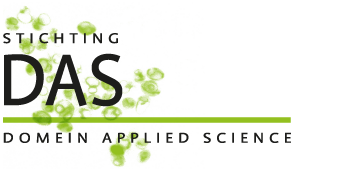Throughout their studies, students gradually attain a range of competencesEen competentie is een combinatie van kennis, vaardigheden en attitude die nodig is voor het uitvoeren van een taak of functie in een bepaalde context.. For example, they receive a proposition and a set-up at the start of their programme before they start their research. In the course of their studies, they will learn to conceptualise that set-up increasingly independently, as well as to transform a client’s problem into a concrete proposition for an experimental research project.
The levels that students reach at the end of their studies vary per programme. The intermediate stages on the road to that end level are evaluated on the basis of what are known as action indicatorsInstrument om competenties concretiseerbaar te maken; een student laat zien dat hij over een specifieke competentie beschikt door op een bepaalde manier te handelen., which are formulated in a way that enables them to visualise a development trajectoryOm een voorbeeld te geven: wanneer een student onderzoek uitvoert en blijkt dat de manier van samenwerken een goed resultaat in de weg staat, krijgt de student daar feedback over en kan daarmee in een vervolgonderzoek gericht aan de slag gaan. Ook kan een student gevraagd worden om tijdens de uitvoering van een experiment extra aandacht te besteden aan een goed labjournaal. En een ouderejaarsstudent kan bijvoorbeeld aan de competentie ‘instrueren’ werken door eerstejaarsstudenten te begeleiden met praktijkproeven. in a concrete way. As such, they are also suitable for providing feedback to students when they are doing research or carrying out an experiment.
At the end of their studies, all students will have developed an analytical, investigative and solution-based attitude. Graduates are capable of performing both independently and as part of a multi-disciplined team, and they are aware of the risks for human beings, animals and the environment, as well as the ethical implications that their research entails.

From student to bachelor: competences and competence-based learning
For all Bachelors of Science, eight competences within the Applied Science domain are very important, three of which are most indicative. Below you will find an overview of these competences.
1. Research
2. Experimentation
3. Development
4. Management
5. Advice
6. Instruction | coaching
7. Project-based work*
8. Self-management
Further explanation of each domain competence can be found via the links given above, along with the connected action indicators for an experienced professional and a description of every intermediate level. The required minimum intermediate level for each per-programme competence has been set in the programme profiles.
In daily professional practice, several competences are called upon quite often. A similar professional practice can be simulated at school as well, e.g. in the form of a group project. Internships are also an excellent way of developing and evaluating competences.
* Please note: The ‘Project-based work’ competence was newly added to the Applied Science Domain set of competences in September of 2023. Project-based work replaces the Leadership | Managing People competence. Both competence overviews will remain available in the profile description throughout the implementation process of Project-based work into the programmes.
Competence-based learning in practice keyboard_arrow_down
The introduction of competence-based learning, in the early 21st century, has reinforced the connection with the professional practice for all DAS programmes. Every institution has a different way of conceptualising this type of education. That is because every programme makes its own choices from a wide range of operational forms for developing competences or their partial aspects. Yet regardless of whether innovative or traditional operational forms are involved: their contents are always determined by the professional practice.
As the Body of Knowledge & Skills describes: knowledge is still of the essence. Professional competences often involve complex skills that also require specialist knowledge. For example: work safety in a laboratory, performing a GC analysis, programming or writing a research report.
Assessing a student’s improvement while attaining competences is done on the basis of the so-called action indicators. That way, teachers are able to actively give their students instructions to observe a number of these indicators while performing an experiment. For example: ‘make sure you set up a work plan, look up literature, and explain the principle of the technology you use.’
An assignment is the perfect way to work on the student’s professional attitude, while involving themselves in the process. The action indicators show which levels require which types of attitude. For example, the difference between an experiment where someone simply carries out a workplan and writes a report, versus someone who also really understands what the various steps comprise, works in a safe way and is capable of translating the results into conclusions.
